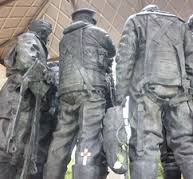A report from the audit firm PwC on the perception of the role of the armed forces finds that the public is increasingly concerned by ‘modern threats’. More than ten times as many people (65pc) think terrorist and non-state groups and cyber-attacks are the biggest threat to the UK as think it is war with another state (6pc).
The report, Forces for change: the public’s view of defence, based on a survey of 2000 people, also finds that a majority of people (53pc) would like to see the UK’s military strength increase in the next 20 years. Some 16pc say they would like it to decrease and 21pc would like it to stay the same. More than half, 58pc of respondents indicate a preference for an armed forces with a large military budget, well trained medium size forces, with naval and air capacity and modern technology, and capable of global deployment.
Survey respondents perceive the armed forces defending the UK from threats abroad, intervening in situations overseas where UK security or citizens are directly threatened, and managing disasters at home and abroad, as very important roles. Yet the research also finds evidence that the public perceive the forces to be under-equipped, raising the issue of whether there will be the capability and capacity to deliver such a broad range of roles.
Roland Sonnenberg, partner at PwC, said: “The public take the view that the military’s strength should be increased and that the armed forces’ roles at home and abroad are very important. This raises questions about how the actual readiness of the forces squares with how ready the public wants them to be. Are the forces capable of supporting both military and non-military roles in the future?”
The report also highlights the gap between the reality and perception of the contribution that the armed forces make to the wider economy. When asked whether maintaining the armed forces has a positive or negative impact on the UK economy, 16pc of respondents answered ‘don’t know’, while 29pc think the military had no net effect on the economy. Of those who did express an opinion one way or another, the results are broadly favourable for the forces: 37pc think that they strengthen the UK economy, with less than half that number (17pc) thinking they weaken it.
Roland Sonnenberg added: “While public support for the forces remains very high overall, this does not appear to be driven by their perceived economic contribution. While more rigorous official data collection would help, more could be done across the defence sector to analyse and communicate the positive socio-economic benefits of their activity. Public awareness could be increased around the contribution defence plays in supporting the economy, training and skilling younger people and creating jobs directly and indirectly in both the British defence supply chain and across the wider economy. Using social media and other digital channels would be effective ways of reaching society generally and particularly the 18-34 year old demographic.
“Each of the armed services are a multi-billion enterprise in their own right and need to help the public understand better the clear economic value that they generate.”
“The forces should consider how best to communicate with and engage the public to improve understanding, explaining the value and benefits they bring, around the breadth of their roles including their peacekeeping and disaster management responsibilities – areas that the public recognise as being very important.”
The report also finds that the armed forces top the list of the UK’s most trusted institutions with 69% of people rating them as either trustworthy or very trustworthy. Only 8pc of respondents rated them as untrustworthy. The NHS was second most highly rated, viewed as trustworthy or very trustworthy by 68pc of respondents.
Reported trust levels vary by age: 77pc of those over 55 trust the forces, while among 18 to 34 year olds the figure is 58pc. However, this finding is not just related to the military; younger people report lower levels of trust in the majority of the institutions mentioned. There are several reasons why this might be the case, the researchers suggest: the effect of a negative public view towards the campaigns in Iraq and Afghanistan; a natural scepticism towards traditional institutions amongst the ‘Net Generation’; and lower recruitment meaning fewer young people are either in the forces or know people who are serving than previously.
Roland Sonnenberg, partner at PwC, added: “These findings have interesting implications in terms of who the public listens to in the debate on future defence needs. The generational differences we have identified may have repercussions for talent management. If 18-34 year olds do not value the forces or understand their purpose to the same degree as older demographics, this may impact on the ability of the defence sector to attract and retain top talent. The forces need to actively engage with young people, as a broader peer group.”
About the survey
Opinium Research carried out an online survey of 2,007 UK adults aged 18-plus from April 16-17, 2015. Results have been weighted to be nationally representative. Results were analysed by age, gender, region and socioeconomic group to gain a deeper understanding of how views towards the Forces vary between different subsets of the population.










